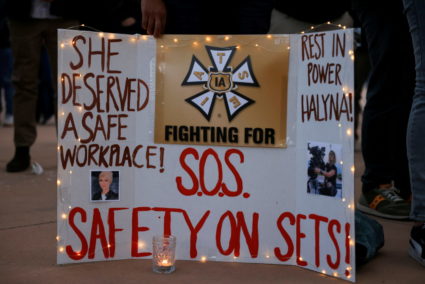
The song, released Wednesday, describes how “a city aflame fought fire and ice ’neath an occupier’s boots,” which Springsteen calls…

LOS ANGELES — Alec Baldwin the actor, who pulled the trigger on a prop gun while filming "Rust" in New Mexico and unwittingly killed a cinematographer and injured a director, likely won't be held criminally or civilly liable for the tragedy.
But Alec Baldwin the producer might be, along with several others in leadership positions for the Western.
Experts predict a tremendous legal fallout from the tragedy, definitely in civil lawsuits and potentially in criminal charges. In addition to Baldwin, a call sheet for the day of the shooting obtained by The Associated Press lists five producers, four executive producers, a line producer and a co-producer. They, as well as assistant director Dave Halls and armorer Hannah Gutierrez, could all face some sort of liability even if they weren't on location Thursday.
The payouts — which could be covered in part by insurance held by the production company, Rust Movie Productions — would likely be in the "millions and millions" of dollars.
READ MORE:Alec Baldwin fired a prop gun that killed cinematographer, officials say
"There was clearly negligence on the set," said Adam Winkler, a professor at the UCLA School of Law and a gun policy expert. "The producers had a duty to preserve the safety of the crew. There were obvious hazards on the set."
Authorities said Friday that Halls, the assistant director, had handed the weapon to Baldwin and announced "cold gun," indicating it was safe to use. But it was loaded with live rounds. Cinematographer Halyna Hutchins was fatally shot and director Joel Souza, who was standing behind her, was wounded.
Baldwin, who is known for his roles in "30 Rock" and "The Hunt for Red October" and his impression of former President Donald Trump on "Saturday Night Live," has described the killing as a "tragic accident."
The production of "Rust" has been beset by disputes from the start in early October and included seven crew members walking off the set just hours before the shooting. The Los Angeles Times, citing two crew members it did not name, reported that five days before the shooting, Baldwin's stunt double accidentally fired two live rounds after being told the gun didn't have any ammunition.
Alarmed by the misfires, a crew member told a unit production manager in a text message, "We've now had 3 accidental discharges. This is super unsafe," according to a copy of the message reviewed by the newspaper.
Winkler called the previous misfires — and an apparent lack of any action taken after them — "a recipe for a very significant liability in damages."
"You can't have a dangerous situation, know about it and then do nothing," he said.
Rust Movie Productions, the production company, says it is cooperating with Santa Fe authorities in their investigation.
"Though we were not made aware of any official complaints concerning weapon or prop safety on set, we will be conducting an internal review of our procedures while production is shut down," Rust Movie Productions said in a statement to The Los Angeles Times.
Although New Mexico law defines involuntary manslaughter in part as a lawful act that resulted in death from "an unlawful manner or without due caution and circumspection," defense attorney Nina Marino said she doubts any criminal case would be filed.
"If a local agency in New Mexico was going to go forward with criminal charges, that would have a real chilling effect on further filming taking place in New Mexico and I think New Mexico appreciates the business," said Marino, who specializes in white collar cases as a co-founder of the Kaplan Marino law firm.
Any film requires insurance coverage and any policy for a Western would hit upon the use of horses, other animals and firearms. The call sheet for Thursday alone mentions multiple guns, several horses and a daily snake wrangler.
An insurer would likely cover any accidental events but the company might not pay for negligence claims on a movie set, according to Julie Shapiro, law professor and director of Loyola Law School's Entertainment and Media Law Institute.
The insurance company will do its own investigation, Shapiro said, to determine if negligence occurred. The exact wording of the policy will determine what the company would pay.
READ MORE: Let computers do it: Film set tragedy spurs call to ban guns
While Baldwin, the other producers, the assistant director and the armorer might be named as parties in a civil lawsuit, not all may be found to be liable — particularly if they played no role in the safety aspects of the production or only held a vanity credit. The plaintiffs would likely go after the production company's deeper pockets.
"How much? To what extent will insurance cover it? This is a loss of life — there is no dollar amount you can place," Shapiro said.
On-set fatalities have led to safety reforms in the past, but Jeff Harris — founding partner at Harris Lowry Manton LLP and the lead attorney in two high-profile trials involving accidental deaths on television and film sets, including stuntman John Bernecker on "The Walking Dead" and camera assistant Sarah Jones on "Midnight Rider" — said incidents like these are rare if the cast and crew follow regulations that are standard for the use of firearms in the film industry.
"They're not complicated," Harris said. "They've been around for years. And it struck me — you don't have this happen if basic safety policies are being followed. The end."
Sustain our coverage of culture, arts and literature.